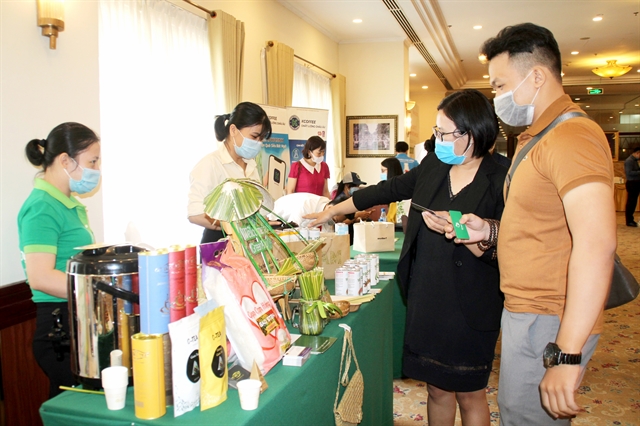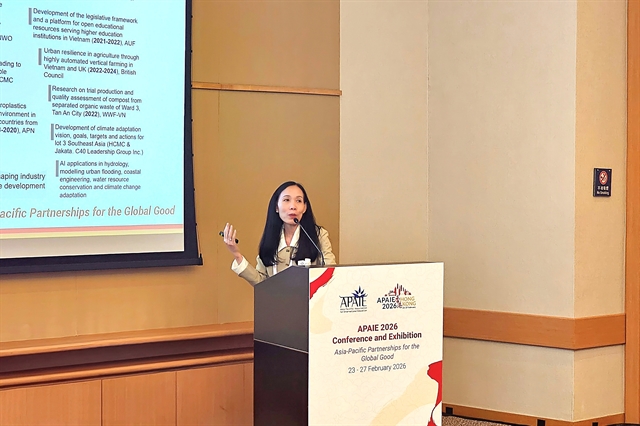 Economy
Economy


|
| Visitors check agricultural goods at a booth on the sideline of Vietnam Food Forum in HCM City. — VNA/VNS Mỹ Phương |
HCM CITY — There has been a surge in demand for healthy foods or immune-boosting, natural, and organic products globally, including Việt Nam, amid the COVID-19 pandemic and even post-pandemic, delegates told the Vietnam Food Forum in HCM City yesterday.
Vũ Bá Phú, director of the Việt Nam Trade Promotion Agency, said cooking and eating at home has become more common.
“Việt Nam’s food industry must be in tune with this consumption trend to continue to develop in the future,” she said.
Nguyễn Hương Quỳnh, founder and CEO of the Blue Ocean Consulting & Ventures, said there has been a shift in consumption of meat to plant-based foods globally.
At the same time, consumers have become increasingly aware of biodiversity conservation, especially in high-end markets.
The global market size for plant-based foods and products replacing meat is estimated to reach US$480.43 billion by 2024, offering a great opportunity for producers of these products, she said.
Global consumers want food brands to be more transparent by providing information involved in their supply chain and consistent nutrition information while enhancing environmental protection.
They also want food brands to come up with more plant-based products and those having various cooking ways.
A recent study by Nielsen showed up to 76 per cent of Vietnamese consumers prefer locally-made products post-COVID-19.
The study also found health is the top concern of Vietnamese with 69 per cent of consumers showing readiness to pay more for high-quality and safe products, much higher than the global average of 49 per cent.
Tracing origins of food products is an inevitable trend in the Industry 4.0 era since food safety is one of the decisive factors for customers when deciding to buy a product.
“By ensuring traceability, enterprises will have an opportunity to raise the competitiveness for their products, the brand’s prestige, and their position in the market," Quỳnh said.
According to delegates, recent market research has shown products with traceability and reliable quality with embedded sustainable economic, social, and environmental value are favoured and maintain great growth potential.
Quỳnh said the pandemic has given Việt Nam’s e-commerce sector a boost, adding that 64 per cent of consumers said they will continue shopping online after the pandemic.
“Online distribution channels will soon account for a majority of the share in enterprises’ revenue structure," she said.
To survive and thrive, food producers must adopt new business models by combining online and offline, embrace digitisation, apply technology in the value chain from farm to table, and improve products’ quality and value, customer experience to their products and services, among others.
Đỗ Thắng Hải, deputy Minister of Industry and Trade, said the agro and aquatic products and food processing industry has enjoyed strong growth in the past year.
Despite difficulties due to the pandemic, the industry, besides ensuring supply to the domestic market, has exported to many countries and territories, with total export revenue reaching $30.05 billion in the first three quarters of the year, a year-on-year increase of 1.6 per cent, he said.
Nguyễn Quốc Toản, director-general of the Food Processing and Market Development Authority, said 30 per cent of the export revenue was from the export of processed products.
His ministry in collaboration with agencies will work to raise the processed rate to add more value to Việt Nam’s agricultural products, he said.
The forum is held as part of the virtual Vietnam Foodexpo 2020, which is being held from December 9-12. — VNS




